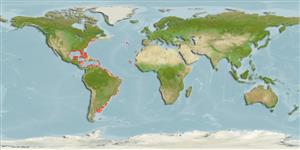| Native range | All suitable habitat | Point map | Year 2100 |

|
| Selene setapinnis AquaMaps Data sources: GBIF OBIS |
Length at first maturity
Lm 20.5 range ? - ? cm
Human uses
Fisheries: highly commercial; aquarium: public aquariums
Phylogenetic diversity index
(Ref. 82805)
PD50 = 0.5039 many relatives (e.g. carps) 0.5 - 2.0 few relatives (e.g. lungfishes)
Trophic Level
(Ref. 69278)
3.7 ±0.52 se; Based on food items.
Resilience
(Ref. 69278)
Medium, minimum population doubling time 1.4 - 4.4 years (tmax=4.5; assuming tm=2-3)